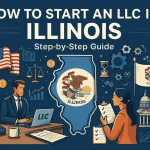Starting an LLC is an exciting step, but it’s easy to slip up on some details if you’re not careful. New entrepreneurs often make a few common LLC formation mistakes that can lead to delays, added costs, or legal issues down the road. The good news is these mistakes are avoidable with a bit of knowledge and preparation.
Below we highlight seven frequent mistakes people make when forming an LLC, along with tips on how to avoid them. By steering clear of these pitfalls, you’ll set up your LLC correctly from the start and save yourself headaches later.
1. Choosing a Conflicting or Unavailable Name
Mistake: Picking an LLC name without properly checking if it’s available and meets state requirements. This can lead to your formation documents being rejected by the state. Some entrepreneurs also inadvertently choose names that infringe on trademarks or use restricted words (like “Bank” or “Insurance”) without permission.
How to avoid it: Do a thorough name search before you file. Search your state’s business name database to ensure no other company is using the name you want. It’s also wise to check the USPTO trademark database to make sure your name isn’t trademarked at the federal level by someone in a similar industry. Make sure your name includes the required legal ending (such as LLC or “Limited Liability Company”) and doesn’t include any prohibited terms. If you find a great name, you might consider reserving it with the state (if available) while you prepare your LLC paperwork. Taking these steps will help you avoid the hassle of a name-related rejection.
2. Not Appointing a Proper Registered Agent
Mistake: Neglecting the requirement of having a registered agent, or choosing an unreliable one. Every state mandates an LLC to have a registered agent to receive legal documents and official notices. Some new business owners list themselves but then use an inconsistent address or aren’t consistently available during business hours, which can cause problems.
How to avoid it: When forming your LLC, designate a dependable registered agent right from the start. This could be you, a trusted associate, or a professional service. If you use your own name, be sure you have a stable address in the state and can reliably handle any legal notices. Otherwise, it’s often safer to use a professional registered agent service. They will provide an address for you in the state and handle important documents (like lawsuits or state letters) promptly, notifying you right away. This keeps your LLC in good standing and prevents situations like missing a lawsuit or state filing because the notice didn’t reach you.
3. Errors in the Formation Documents
Mistake: Submitting your Articles of Organization with mistakes or missing information. Common errors include misspelling the LLC name, providing an incorrect address, or leaving required fields blank. Sometimes people use the wrong form for their state or forget to sign where needed. These errors can lead to the state rejecting your filing, meaning you have to fix the mistake and re-file (often with another fee).
How to avoid it: Fill out your LLC formation documents carefully and double-check everything. Read the instructions provided by your state’s filing office. Ensure that every section is completed correctly: the LLC name is exactly as you want it (including punctuation and LLC suffix), addresses (physical and mailing) are accurate, the registered agent’s information is correct, and you’ve included all necessary pages or cover sheets. If your state requires additional documents (like an initial report or publication proof), make sure to include those. It can help to have someone else review the forms as well. Alternatively, consider using an LLC formation service or attorney to prepare and file the documents; their expertise can catch errors you might miss.
4. Skipping the Operating Agreement
Mistake: Thinking you don’t need an operating agreement because it’s not required to be filed with the state. Many single-member LLC owners skip this step, and even some multi-member LLCs proceed without a formal operating agreement, which can lead to confusion or disputes later on.
How to avoid it: Always create an operating agreement for your LLC, even if it’s not legally required to file one. This internal document lays out how your LLC will operate – covering ownership percentages, how profits and losses are divided, how decisions are made, and what happens if a member leaves or if the business dissolves. If you’re the only owner, the operating agreement is still useful to reinforce the separation of your business from personal affairs (helping maintain your liability protection). For multiple owners, it’s crucial for setting expectations and rules so everyone is on the same page. You can find templates to draft your own operating agreement or get professional help. The key is to have this agreement signed and stored with your records soon after forming the LLC.
5. Forgetting to Obtain an EIN and Necessary Licenses
Mistake: Forming the LLC but then failing to get an Employer Identification Number (EIN) or any required business licenses. An EIN is needed for various important tasks like opening a bank account or hiring employees. Licenses or permits might be necessary for your type of business (for example, a local business license, seller’s permit for sales tax, or professional license).
How to avoid it: Shortly after your LLC is approved, apply for an EIN from the IRS (if you didn’t already request one during the formation process or through a service). It’s free and you can do it online in minutes. Also, research what licenses or permits your business might need at the city, county, and state levels. Often, your city or county government will require a general business license to operate legally. Certain industries (like food service, childcare, construction, etc.) may have additional licensing requirements. By handling these right after formation, you ensure your new LLC is fully compliant and ready to do business.
6. Mixing Personal and Business Finances
Mistake: Using your personal bank account for LLC transactions or otherwise commingling funds. After forming the LLC, some owners continue to pay business expenses out of personal accounts or deposit business income into a personal account. This can undermine the liability protection of the LLC because it blurs the line between the business and the owner.
How to avoid it: Open a separate business bank account for your LLC as soon as you have your EIN and formation documents. Always run your LLC’s income and expenses through this business account. Use a dedicated business credit card or debit card for company purchases. By keeping finances separate, you maintain the legal distinction of your LLC (which is important if you ever need to defend that your personal assets should be protected). Proper bookkeeping from day one will also save you a lot of trouble at tax time and give you a clearer picture of how your business is doing.
7. Ignoring Ongoing Compliance Obligations
Mistake: Thinking the work is over once the LLC is formed. New LLC owners sometimes overlook the annual requirements that come with maintaining an LLC. This could include failing to file an annual report, not paying a required annual fee or franchise tax, or not renewing necessary licenses. Over time, this neglect can cause your LLC to fall out of good standing or even be dissolved by the state.
How to avoid it: Make a note of all ongoing compliance tasks for your LLC. Most states have an annual (or biennial) report that needs to be filed by a certain due date, along with a fee. Mark this on your calendar or set a reminder well in advance of the deadline each year. If your state has a franchise tax or other annual tax for LLCs (like Delaware or California, for example), keep track of those payments. Renew any local licenses or permits as required. To simplify, some business owners use their registered agent service or a compliance service that sends reminders for these filings. Staying on top of these obligations will keep your LLC in good standing and prevent penalties or administrative dissolution.
Conclusion:
Mistakes in the LLC formation process can cost you time, money, and even the legal protections you set out to gain. The seven issues above are very common, especially for first-time entrepreneurs, but now you know how to avoid them. The key takeaway is to do your homework at each step: choose your name carefully, pay attention to the filing details, and handle the “after formation” tasks like banking and compliance diligently.
If you’re ever unsure about something, don’t hesitate to seek guidance. You can consult with an attorney or use a reputable LLC formation service which often provides guidance and ensures that all necessary steps are completed correctly. Using a professional service can automatically take care of tasks like checking name availability, filing paperwork accurately, and even helping with your operating agreement and EIN – thus sidestepping many of the pitfalls we discussed.














